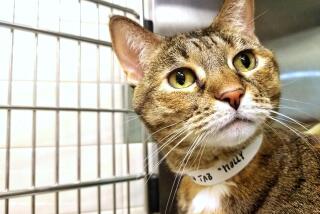Depression Could Be a Sign of Illness
Q: Over the past three weeks, our 4-year-old female cat has had bouts of depression, loss of appetite and avoids the rest of the family. These spells last for two to four days and then she seems to feel better again. She has been fixed and was vaccinated about six months ago. When our vet saw her about two weeks ago, she had a slight temperature. He gave her an injection and sent home some tablets to help keep her temperature normal. She seemed to improve for about five to six days before she returned to her quiet state.
Is there something else we should do for her? Should we keep her on more pills? What do you think might be causing her problem?
Mrs. Marshall Hale, Long Beach
A: Frequent episodes of fever or depression in pets can be due to several diseases or disorders. Most commonly, we see periodic episodes of fever as an indication of viral diseases. Digestive disorders, urinary infections, and certain metabolic diseases can all cause frequent series of weakness, depression, and listlessness.
It would be wise to have your cat seen by your veterinarian as soon as any of these signs recur. A physical examination and temperature should be taken. It would be very helpful to do a complete lab profile, including a complete blood count, a chemical profile and urinalysis. The blood tests should also include serum viral tests for the feline leukemia virus (FeLV), feline immunosuppressive virus (FIV), and feline infectious peritonitis (FIP). Depending upon findings at the exam, radiographs may be needed.
Your veterinarian may start your cat on medication but change it as soon as more information becomes available. Follow-up lab tests may be necessary to follow your pet’s progress. In the meantime, do not give your cat any home medications, especially aspirin or Tylenol-like products, since they are toxic to cats.
Q: I have two white rabbits that are kept in a fairly large hutch. My problem is that they constantly chew up all the wood borders of the hutch and make holes in the wires. Is there anything that I can do or use to keep them from doing some chewing? Should I coat the wood with something bitter?
Dan Santiago, Santa Ana
A: Rabbits, like other rodents, need to chew on things in order to keep their teeth the proper length. Rabbit teeth grow constantly and need to be kept worn by chewing or there will be problems with their alignment. If rabbits are unable to chew, their teeth may grow excessively long and even grow into the jaw or the roof of the mouth. You may want to supply wood scraps or limb branches for your rabbits to chew on instead of their cage. Make sure that the wood is clean and untreated with any chemicals or paint.
More to Read
Sign up for Essential California
The most important California stories and recommendations in your inbox every morning.
You may occasionally receive promotional content from the Los Angeles Times.









